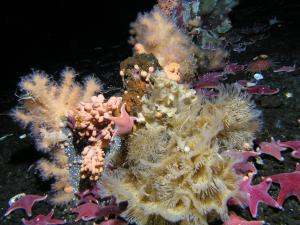
Welcome to the Life Science Collection, a library of resources for educators and the public interested in learning more about organisms in the Arctic and Antarctic regions. The field of life science includes but is not limited to understanding organisms, their organization, life processes, and relationships to each other and their environment.
The Collection includes individual activities, lesson plans, journal entries, videos, and presentations that will educate the next generation about this complex field of study. All materials are created and compiled by world-class educators participating in authentic scientific research in the polar regions through PolarTREC expeditions.
The Life Science Collection is utilized as class material in the Cyber-based Interdisciplinary Science Education Professional Development Courses offered through the University of Alaska- Fairbanks in conjunction with PolarTREC. The collection is funded by the Arctic Research Consortium of the United States and the National Science Foundation Office of Polar Programs.


![]()
